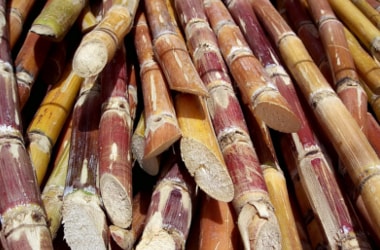Agriculture - Current Affairs for August, 2017
Agriculture Current Affairs for August, 2017
Month wise coverage of Agriculture Current Affairs helps you improve your general knowledge and prepare for all competitive exams like IBPS, Bank PO, SBI PO, RRB, RBI, LIC, Specialist Officer, Clerk, SSC, UPSC, Railway etc. This section is updated daily with the most important events.Preparing Agriculture Current Affairs August, 2017
1. Read the most important Agriculture Current affairs and facts here. 2. Take practice test of our Agriculture MCQ and Objective type questions. 3. Clear any quiz, GK, job interview or competitive exam on current affairs.
- Month & Year
▼ First sugarcane hybrid clone variety launched [08-30-17]
 For the first time, hybrid clone variety 205 (Saccharum officinarum and Saccharum spontaneum) was developed for sub-tropical climate, which was launched in 1918 for commercial farming. For the first time, hybrid clone variety 205 (Saccharum officinarum and Saccharum spontaneum) was developed for sub-tropical climate, which was launched in 1918 for commercial farming.
The hybrid clone led to 50% increase in sugarcane production in North India and popular species like Saccharum Barberi and Saccharum Sinensis were left far behind.
After developing species 205, ICAR's Sugarcane Breeding Institute developed several other hybrid clones for sub-tropical condition and they remained sought after for a long time.
After that, the institute developed species 312, first amazing cane variety for the subtropical climate in 1928 and in 1933, it developed species 419 for tropical climate.
The sugarcane farmers are reaping higher yield from the species 0238 and sugar mills are getting more sugar.
Sugarcane farmers can make the best of intercropping technique and increase their income by growing oilseeds, pulses, potatoes, and cucumber with cane.
|
▼ No GM crop without evaluation: GoI [08-28-17]
 No genetically modified (GM) crop should be introduced in India unless the biosafety and socio-economic desirability is evaluated. No genetically modified (GM) crop should be introduced in India unless the biosafety and socio-economic desirability is evaluated.
The committee has also recommended that the environment ministry should examine the impact of GM crops on environment thoroughly.
The remarks come after India’s GM crop regulator Genetic Engineering Appraisal Committee (GEAC) recently recommended the commercial use of genetically modified mustard.
This was in a submission to the environment ministry.
The department-related parliamentary standing committee on science and technology and environment and forest made its recommendations in its 301st report on ‘GM crop and its impact on environment’
It said GM mustard being a herbicide-tolerant GM organism (GMO), there is clear evidence on the adverse impacts of such GMOs elsewhere in the world.
The report of the committee, chaired by Congress leader Renuka Chowdhury was presented to the Rajya Sabha chairman.
The committee noted that the GEAC has given its approval for commercialisation of GM mustard “inspite of the fact that the matter is pending for decision in the Supreme Court”.
The Centre for Genetic Manipulation of Crop Plants (CGMCP), Delhi University, had submitted an application to the GEAC for the environmental release of GM mustard (Brassica juncea) hybrid DMH - 11.
It also focused on the use of parental events (varuna bn 3.6 and EH2 mod bs 2.99) for the development of a new generation of hybrids.
|
▼ AGRI UDAAN: Food and Agribusiness Accelerator 2.0 [08-4-17]
 ICAR-NAARM Technology Business Incubator (TBI), a-IDEA and Indian Institute of Management Ahmedabad’s (IIM-A) incubator Centre for Innovation, Incubation and Entrepreneurship (CIIE) announces “AGRI UDAAN”- Food and Agribusiness Accelerator 2.0. ICAR-NAARM Technology Business Incubator (TBI), a-IDEA and Indian Institute of Management Ahmedabad’s (IIM-A) incubator Centre for Innovation, Incubation and Entrepreneurship (CIIE) announces “AGRI UDAAN”- Food and Agribusiness Accelerator 2.0.
This programme will help to selected innovative startups who will be mentored in to scale up their operations in agri value chain for effective improvement in agriculture.
This is a 6 month program in which shortlisted agri startups with promising innovative business models will be mentored & guided to scale up their operations.
Accelerators are 4-8 month program aiming at scaling up innovative startups with a working prototype and initial market traction.
This is done through education, mentorship, and financing.
Startups enter accelerators for a fixed-period of time, and as part of a cohort. The cohort is shortlisted by evaluation panel comprising of industry veterans, business experts, R&D scientists.
Four distinct factors that make accelerators unique are fixed term, cohort based, mentorship driven and they culminate into demo day.
Looking at the impact created through NAARM TBI a-IDEA India’s first Food & Agribusiness accelerator 2015 in partnership with IIM-A CIIE, National Science and Technology Entrepreneurship Development Board (NSTEDB), DST has come forward to support AGRI UDAAN.
Through AGRI UDAAN DST will be reaching out to agri-startups across the country with a series of road shows in Chandigarh, Ahmedabad, Pune, Bangalore, Kolkata & Hyderabad.
This initiative is backed by Caspian Impact Investments as Platinum Partner, Yes Bank as Banking Partner, NCDEX eMarkets Ltd (NeML) & Marico Innovation Foundation as Silver partners.
AGRI UDAAN also received support from National Research Development Corporation (NRDC), Agrinnovate as tech transfer partners, and FICCI as outreach partner.
Selection Through Agri UDAAN
- The application is available at www.aidea.naarm.org.in.
- Applications will be evaluated by mentors from industry, business and partner organizations, based on the average scores top 40 startups will be shortlisted and allowed to pitch in front of panel of evaluators during cohort finalization programme on 9th and 10th of October 2017 at NAARM.
- Out of these about 8 to 12 startups will be selected for final cohort for capacity building workshop.
- The shortlisted cohort of startups will undergo a capacity building (CB) workshop in ICAR-NAARM. During this period, the startups will be trained in different aspects of technology commercialization, product validation, business plan preparation, risk analysis, customer engagement, finance management, fund raising etc.
- There will be a match making between startup-mentor. The accelerator program will culminate with demo day/ investors meet at Hyderabad and Mumbai.
|